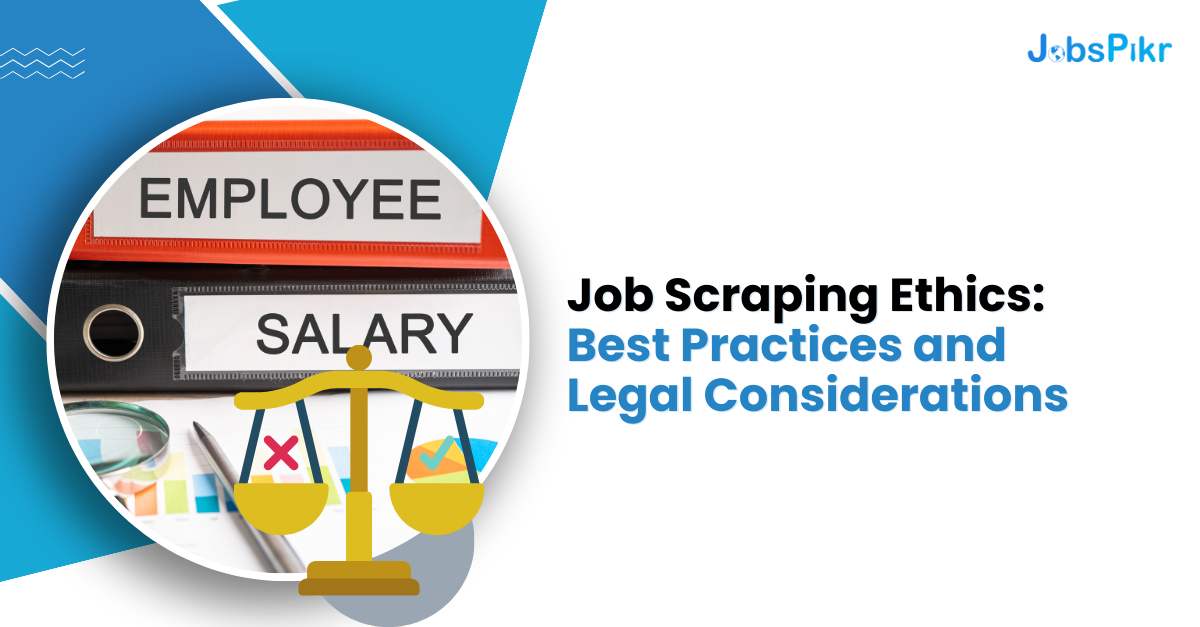Web scraping has revolutionized how businesses gather data, including job market insights. However, the practice of job scraping ethics —extracting job listings and related data from websites in legal considerations. This article explores the landscape of job scraping ethics, offering best practices to ensure compliance and respect for data privacy.

What is Job Scraping?
Job scraping involves automated scripts or tools that extract job postings from company websites, job boards, and other online sources. This data can be used for market analysis, competitor insights, and recruitment strategy optimization. While the benefits are substantial, it’s crucial to navigate this space responsibly.
Understanding Job Scraping Ethics
Job scraping involves the collection of job posting data, which can sometimes include sensitive personal information like contact details and salary data. It’s crucial to handle this data responsibly by ensuring it is anonymized and used solely for legitimate purposes. Moreover, ethical scraping practices necessitate obtaining consent from website owners or users whenever possible. Transparent communication about how the data will be used helps build trust and avoids ethical pitfalls, reinforcing the importance of respect for data privacy in job scraping.
- Respect for Data Privacy:
- Personal Information: Job posting data may contain sensitive information, such as contact details and salary data. The tool must ensure that personal data is handled responsibly, anonymized if necessary, and used only for legitimate purposes.
- User Consent: Whenever possible, obtain consent from website owners or users before scraping data. Transparent communication about data use builds trust and avoids ethical pitfalls.
- Data Accuracy and Integrity:
- Misrepresentation: Avoid altering or misrepresenting the data you collect. Ensure that job postings are accurately represented and that any analysis or insights derived from the data maintain integrity.
- Source Credibility: Scrape data only from reliable and reputable sources to ensure the quality and reliability of the information.
- Purpose and Use of Data:
- Ethical Use: Use scraped data ethically. Avoid using the data for activities that could harm individuals or businesses, such as spamming, unsolicited marketing, or competitive sabotage.
- Transparency: Clearly communicate the purpose and use of scraped data to stakeholders and users. Ethical transparency fosters a culture of trust and accountability.

Legal Considerations in Job Scraping
- Adherence to Web Scraping Laws:
- Terms of Service (ToS): Many websites have specific terms of service that prohibit or restrict scraping. Always review and comply with these terms to avoid legal repercussions.
- Copyright and IP Laws: Ensure that your scraping activities do not infringe on intellectual property rights. Use data in a manner consistent with copyright laws and fair use policies.
- Data Protection Regulations:
- GDPR Compliance: For businesses operating in or targeting the European Union, compliance with the General Data Protection Regulation (GDPR) is mandatory. This includes respecting individuals’ data rights and ensuring data security.
- CCPA Compliance: In the United States, the California Consumer Privacy Act (CCPA) imposes similar data protection obligations. Ensure compliance with CCPA when scraping data from or about California residents.
- Robots.txt and NoIndex Tags:
- Respect Robots.txt: This file, found on many websites, outlines which parts of the site can and cannot be scraped. Respect these directives to avoid unauthorized access.
- NoIndex Tags: Pay attention to NoIndex tags in HTML headers, which signal that certain pages should not be indexed by search engines or scrapers.
Best Practices for Job Scraping
To ensure ethical and effective job scraping, it’s essential to develop a comprehensive scraping policy that outlines the legal and ethical guidelines for all scraping activities. This policy should be communicated to all team members to ensure adherence. Responsible scraping techniques are vital; implement rate limiting to avoid overloading servers and use IP rotation to prevent detection without abusing the system. Regular compliance audits are necessary to ensure ongoing adherence to evolving laws and ethical standards, adjusting practices as needed. Additionally, engaging legal counsel can help navigate the complex legal landscape, ensuring that all scraping activities remain compliant with relevant regulations.
- Develop a Scraping Policy:
- Establish a clear policy outlining the ethical and legal guidelines for scraping activities. Ensure all team members are aware of and adhere to these guidelines.
- Use Responsible Scraping Techniques:
- Rate Limiting: Avoid overloading servers by implementing rate limiting and respectful scraping frequencies.
- IP Rotation: Use IP rotation to prevent detection and blocking, but do so ethically, ensuring it does not lead to abuse.
- Regular Compliance Audits:
Conduct regular audits to ensure that scraping activities comply with evolving laws and ethical standards. Stay updated on legal changes and adjust practices accordingly.
- Engage Legal Counsel:
Consult with legal experts to navigate complex legal landscapes and ensure compliance with relevant regulations.
Conclusion
Job scraping can provide valuable insights and competitive advantages, but it must be conducted ethically and legally. By respecting data privacy, adhering to web scraping laws, and using scraped data responsibly, businesses can leverage job scraping ethics to its fullest potential without compromising the standards. Embracing these best practices ensures a balanced approach that respects both the law and the individuals behind the data.
By following these guidelines, organizations can navigate the complexities of job scraping ethics with confidence, securing valuable insights while maintaining ethical integrity and legal compliance. To ensure your job scraping activities are ethical and compliant with legal standards, log in to Jobspikr for reliable and responsibly sourced job data.



